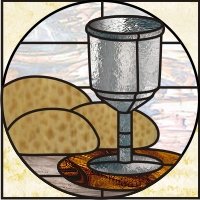A Holy Communion Service

Since the earliest days of the Apostles, Christian people have gathered together for worship, remembering Jesus in the breaking of bread and the sharing of wine. This act of worship has many names: the Lord's Supper; Holy Communion; the Mass (an English form of missa, from the Latin word 'to send') and Eucharist, from the Greek word for 'thanksgiving'. Each of these names reminds us of a particular aspect of the service's significance.
Liturgy: the action of the people.
Liturgy ('the action of the people') simply means the things we do and say in a church service. Every member of the Church has a part in each service they attend. The liturgy is not something that is 'performed' by robed professionals in front of an audience. It is a celebration on the part of the whole worshipping community. For of each us, the service contains symbols of our lives. We each bring the experiences, concerns and hopes that are uniquely our own.
In company with fellow Christians, we pray for God's strength and guidance, and in the Communion receive the assurance of God's love.
At the close of the service, we offer ourselves in readiness to serve God in the world, in whatever distinctive way God calls each and all of us.
What we do at a Holy Communion Service (Eucharist)
THE GATHERING
We wait quietly for the service to begin. After the procession, the minster greets the people. In prayer we commend our worship to God. The Gloria (Glory to God in the highest …) echoes the angels' song of praise at the birth of Christ, celebrating God's renewed relationship with humanity. The prayers of the whole congregation are gathered in the Prayer of the Day or 'Collect'.
THE LITURGY OF THE WORD
The Bible readings and the sermon proclaim God's acts in the world, and lead us to respond to them in our own words and deeds. The Bible readings are taken from the Revised Common Lectionary, a three-year cycle of readings used by all the major denominations.
The Nicene Creed
The Creed is a text from early in the Church's history. The final form was agreed at the Council of Constantinople in AD 381 (a process that began at the Council of Nicea in AD 325, hence the name Nicene Creed). The Creed affirms Christ's divinity and humanity and the Church's belief in God as Father, Son and Holy Spirit.
Prayers of Intercession and Confession
We bring to God our concerns for the Church and the world and join in the Lord's Prayer, the prayer that Jesus taught.
We call to mind our sin and ask God's forgiveness, which the priest declares to us.
The Peace
The greeting of peace is an affirmation of our common identity as the Body of Christ, and an expression of our desire to be reconciled to God and to one another.
THE LITURGY OF THE SACRAMENT
Preparation of the Table
Bread and wine are placed on the table and a collection taken. The Parish supports itself wholly from the collections, the rental of the church hall and church, and other fund raising.
The Eucharistic Prayer
The Eucharistic Prayer, the great prayer of thanksgiving, recounts God's love for humanity. The Sanctus (Holy, holy, holy Lord …) recalls the words of Isaiah's vision of heavenly worship. We pray that by the power of the Holy Spirit, the gifts of bread and wine may be to us the Body and Blood of Christ. We remember the supper Christ held with his disciples before his death. We pray that the Spirit of God will come upon us and renew us.
The Breaking of the bread
Jesus said: "I am the bread of life." We break the bread in remembrance of his gift of himself and our oneness in him.
Receiving the bread and wine
God gives Godself to us, and we give ourselves to God.
SENDING OUT OF GOD'S PEOPLE
The Church is called both to worship and witness. We prepare to return to our everyday activities and work as ambassadors of Christ's love and peace.